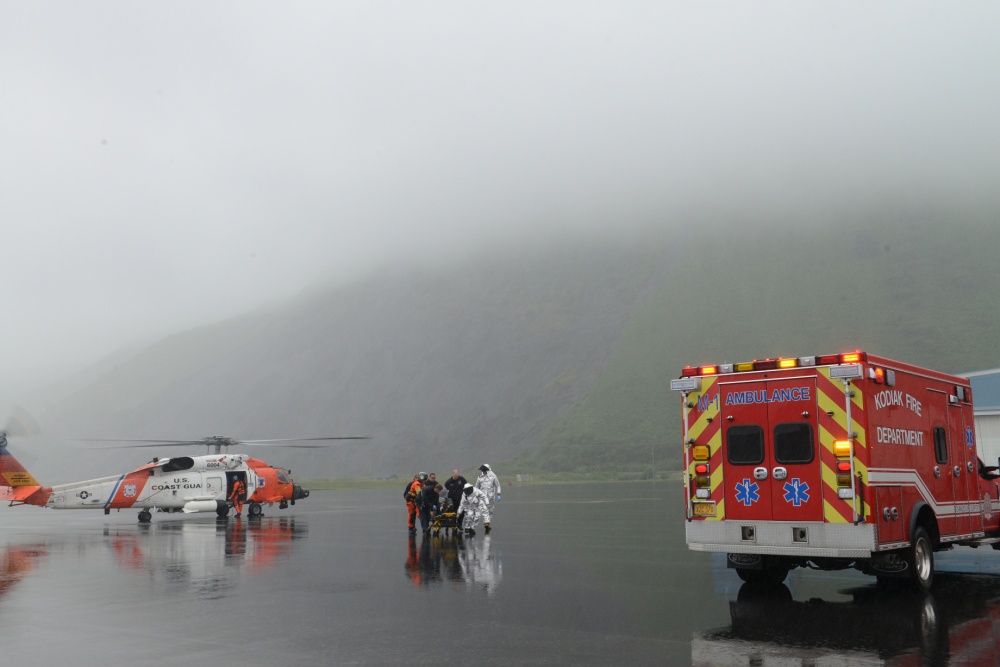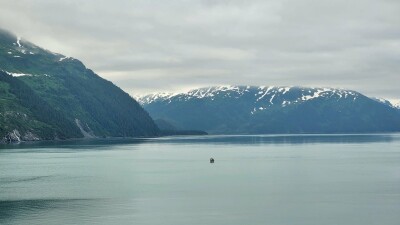Rescue and recovery tales from around the country and beyond. In this edition, two helicopter medevacs in Alaska, electrical issues near Trinidad and three fishermen rescued from Georgia waters.
Alaska
A Coast Guard helicopter crew from Air Station Sitka rescued three people after the F/V EH grounded in Peril Strait on March 21.

A Coast Guard air crew from Sitka rescued three people after their boat ran aground. U.S. Coast Guard photo.
Coast Guard Sector Juneau received a mayday call via VHF channel 16 from the 40-foot boat asking for assistance after the vessel ran aground and began taking on water at Saook Point, approximately 30 miles north of Sitka. The crew reported they were not in danger but expected to lose communications. They had a life raft ready to use if needed.
The helicopter crew landed on shore and took the three crew members to Sitka in good condition.
The helicopter crew reported a 100-foot sheen, and it was reported that the boat had as much as 120 gallons of diesel fuel on board.
Sitka's Marine Safety Detachment responded to the grounding. It was reported that diesel discharged from the fishing vessel’s vents.The owner was working on a salvage plan soon after rescue. There were no reports of affected wildlife in the area.
“MSD Sitka will continue to work with the responsible party as they take action,” said Petty Officer 1st Class Ken Farah, a marine science technician with MSD Sitka. “We will monitor to ensure adequate progress is being made and their efforts to mitigate pollution is effective.”
The cause of the grounding is under investigation.
A Kodiak Coast Guard helicopter crew medevaced a 44-year-old man from the F/V Saint Peter approximately 60 miles from Dutch Harbor on March 23.
The Coast Guard 17th District command center received a medevac request from the Saint Peter's captain for an unconscious and unresponsive man.
The helicopter crew hoisted the man and safely transported him to Dutch Harbor emergency medical personnel.
“Saving lives is one of our missions,” said Petty Officer 1st Class Trevor Frommherz, District 17 command center search and rescue controller. “The Coast Guard is on call 24 hours a day, seven days a week. We have assets and personnel available to assist in all weather conditions and in any type of situation, as we are always ready.”

A Coast Guard Air Station Kodiak MH-65 Dolphin helicopter crew hoists a 59-year-old fisherman from the F/V Golden Eagle. U.S. Coast Guard photo.
A Kodiak helicopter crew medevaced a 59-year-old man from the F/V Golden Alaska approximately 40 miles northwest of Cold Bay on March 30.
The district command center received a medevac request from Health Force Partners for a crewman suffering from inhalation of unknown chemicals. Watchstanders notified the Coast Guard duty flight surgeon who recommended the medevac.
The aircrew hoisted the man and safely transported him to LifeMed emergency aircraft medical personnel in Cold Bay for further care to Anchorage.
Pacific
The Coast Guard assisted two Dungeness crab fishermen aboard the 40-foot F/V Radiant approximately five miles west of Trinidad on Monday, March 19.

The F/V Radiant. U.S. Coast Guard photo.
The boat's crew contacted Coast Guard Sector Humboldt Bay via channel 16 around 11 p.m., reporting that their vessel was experiencing electrical and propulsion issues.
The Coast Guard dispatched a 47-foot motor lifeboat crew. That crew placed the Radiant in a side tow around 1 a.m. on Tuesday, and embarked on the three hour transit to Woodley Island Marina in Eureka.
There were no reports of injury.
Gulf & South Atlantic
Navy and Coast Guard personnel rescued three fishermen 63 miles southeast of Brunswick, Ga., on March 27.

Three fishermen were rescued by the USS Hue City. U.S. Navy photo.
The Coast Guard's 7th District received an EPIRB alert from the 42-foot F/V Barbara Lynn at approximately 3:30 a.m. Watchstanders released an enhanced group calling message, launched a helicopter crew from Savannah and diverted the cutter Tahoma to the vessel’s last known position.
The crew of the USS Hue City was within about a mile of the last known position of the distressed boat and reported seeing orange flares, flashing lights and located a raft with three fishermen aboard surrounded by debris.
The crew of the Hue City rescued all three fishermen from the raft and transported them to a helicopter, from which they were transferred to emergency medical services in Mayport.
“This case highlights the close cooperation between the Coast Guard and the Navy as well as the importance of having the right safety equipment onboard,” said Lt. Cmdr. Ryan Kelley, the Coast Guard’s District Seven Public Affairs Officer. “The Emergency Position Indicating Radio Beacon, flares and flashing light, without question, helped lead rescue crews directly to their location to get them home safely."







